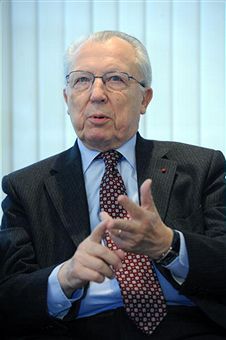 An old enemy of England nestles in the pages of today’s Daily Telegraph. Charles
Moore travelled to Paris to meet Jacques Delors, the architect of the euro and advocate of Europe’s ‘social dimension’. Moore found defiance where one might have expected
humility, perhaps even repentance. Delors insists that the fault was in the execution not the design of the euro. He thinks that the euro’s ‘Anglo-Saxon critics’ were correct in
their analysis of the euro’s structural failings; he believes that
Europe’s political leaders did not go far enough in ‘founding [economic] co-operation between member states’, which would have promoted the beloved ‘social dimension’
by harmonising fiscal, welfare and employment policies. He tells Moore: ‘I said all these things [at the time], but I was not heard. I was beaten.
An old enemy of England nestles in the pages of today’s Daily Telegraph. Charles
Moore travelled to Paris to meet Jacques Delors, the architect of the euro and advocate of Europe’s ‘social dimension’. Moore found defiance where one might have expected
humility, perhaps even repentance. Delors insists that the fault was in the execution not the design of the euro. He thinks that the euro’s ‘Anglo-Saxon critics’ were correct in
their analysis of the euro’s structural failings; he believes that
Europe’s political leaders did not go far enough in ‘founding [economic] co-operation between member states’, which would have promoted the beloved ‘social dimension’
by harmonising fiscal, welfare and employment policies. He tells Moore: ‘I said all these things [at the time], but I was not heard. I was beaten.
As Delors’ analysis deepens, his contempt for recent generations of politicians emerges. The West’s apogee, for Delors, was the fall of the Berlin Wall. Helmut Kohl, François Mitterrand, George Bush senior and Mikhail Gorbachev ‘reacted quickly to this revolution, thanks to the intelligence of these men. There was an aspect of sangfroid and political vision.’ Delors even praises Mrs Thatcher, his most determined adversary, for her vision and immense capacity for work. More recent leaders pale shamefully next to these titans, and he blames the euro’s current travails on successive ‘finance ministers [who] did not want to see anything disagreeable which they would be forced to deal with’, such as closer union and structural reform. Where there should have been resolve, there has only been a ‘cacophony of statements’.
It’s little surprise that a proud Frenchmen talks so freely on this subject, which might be translated as European exhaustion. It has been a theme in French intellectual culture for nearly twenty years, particularly in the grim early novels of Michel Houellebecq. Europe’s economic decline, its political malaise, its entrenched social and employment crises, its simmering cultural and racial tensions – all lurk beneath the spectacle of the Eurozone crisis. Delors says that Britain is not immune. He holds that David Cameron is ‘embarrassed’ by the financial crisis and it’s surprising that he didn’t also describe the summer riots as another example of the general European exhaustion; after all, Paris, Marseille and La Rochelle have suffered similar enormities in the recent past.
The former Commission President’s solution is hilariously familiar: ‘either to accept a greater transfer of sovereignty or to submit to a common discipline.’ It is not at all clear what Angela Merkel and Nicolas Sarkozy will agree to; but, to an extent, they represent the two halves of Delors’ answer. Sarkozy is intent on securing closer union to concentrate French influence, while Merkel is determined to impose Germanic discipline on her country’s neighbours to protect its exhausted taxpayers. Delors believes that there is more to Europe than money, but the current generation (Sarkozy included, if his recent speech on France’s labour market is indicative) disagree: this is the age of restraint, not the ‘social dimension’. Whether the political dimension of European Union can subsist in the age of restraint is another matter.






Comments